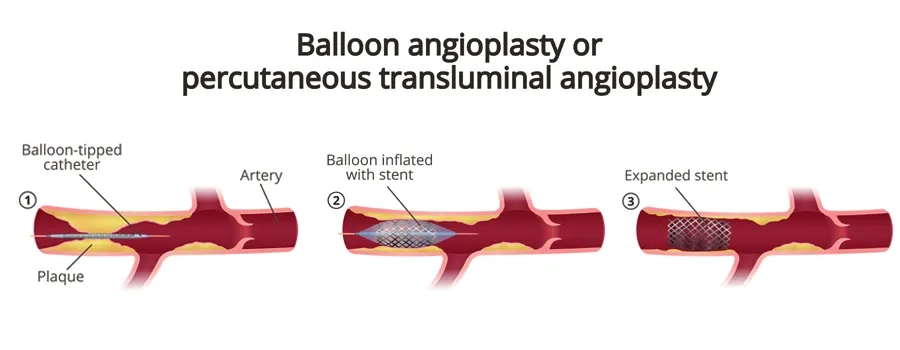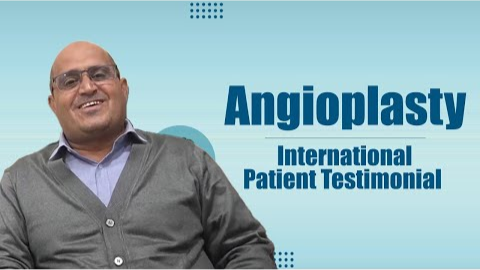What Is a Percutaneous Transluminal Coronary Angioplasty?
Percutaneous Transluminal Coronary Angioplasty, or PTCA, is a medical procedure used to open narrowed or blocked arteries in the heart. These blockages are usually caused by plaque buildup, which can reduce blood flow and lead to chest pain or heart attacks.
During the percutaneous transluminal coronary angioplasty procedure, a thin tube called a catheter is inserted into a blood vessel, usually in the arm or leg, and guided to the affected coronary artery. A small balloon at the tip of the catheter is then inflated to widen the artery and improve blood flow. In many cases, a tiny mesh tube called a stent is placed to keep the artery open.
PTCA is a minimally invasive percutaneous transluminal coronary angioplasty surgery, which means it does not require large incisions. It helps relieve chest pain, improves heart function, and reduces the risk of future heart problems. Most people can return to normal activities within a few days, with proper follow-up care.
Types of Percutaneous Transluminal Coronary Angioplasty (PTCA)
There are different types of PTCA procedures, depending on the heart condition and the patient's needs:
- Balloon Angioplasty: The most common type, where a small balloon is inflated inside the blocked artery to widen it and improve blood flow.
- Stent Placement: After the artery is widened, a tiny mesh tube called a stent is inserted to keep the artery open and prevent future blockages.
- Drug-Eluting Stent (DES): A stent coated with medication that slowly releases drugs to reduce the chance of the artery narrowing again.
- Bare-Metal Stent (BMS): A standard stent without medication, used in certain cases based on the patient's condition.
- Rotational Atherectomy (Rotablation): Used for hard or calcified plaques, this technique involves a tiny rotating device to remove plaque before placing a stent.
30 minutes to 2 hours
Surgery Duration
Local Anesthesia with mild Sedation
Anesthesia Used
1-2 Weeks
Full Recovery Timeline

When is Percutaneous Transluminal Coronary Angioplasty Recommended?
Percutaneous transluminal coronary angioplasty indications include situations where narrowed or blocked coronary arteries reduce blood flow to the heart. Common situations include:
- Angina (Chest Pain): When lifestyle changes or medications do not relieve persistent chest pain caused by restricted blood flow.
- Heart Attack (Myocardial Infarction): PTCA can be performed urgently to restore blood flow and reduce heart damage during a heart attack.
- Severe Coronary Artery Disease: For patients with significant blockages in major coronary arteries that affect heart function.
- Failed Medication or Other Treatments: When medications, lifestyle changes, or other non-invasive treatments are not effective in controlling symptoms.
- High-Risk Patients: In certain cases, PTCA is chosen to prevent further complications and improve overall heart health.
PTCA helps improve blood flow, relieve symptoms, and lower the risk of future heart problems. Your cardiologist will recommend this procedure based on your heart condition, test results, and overall health.
Preparing for Percutaneous Transluminal Coronary Angioplasty Procedure
Preparing well for Percutaneous Transluminal Coronary Angioplasty (PTCA) helps ensure a safe procedure and smooth recovery. Following your cardiologist's instructions and making simple lifestyle adjustments can improve outcomes and comfort.
Medical Evaluation & Pre-Procedure Visit
- Review your full medical history, current medications, allergies, and heart condition with your cardiologist.
- Complete necessary tests like ECG, blood work, or coronary angiogram to confirm readiness for the procedure.
- Ensure all test results are available at least a few days before the procedure to finalize scheduling and address any concerns.
Health Habits & Lifestyle Adjustments
- Avoid smoking for at least 1-2 weeks before the procedure, as it can affect heart health and recovery.
- Limit alcohol and follow your doctor's instructions regarding medications, especially blood thinners.
- Maintain a balanced diet with adequate protein, vitamins, and minerals to support recovery.
Prepare Your Home and Support System
- Arrange for someone to drive you to and from the hospital and stay with you for the first 24 hours.
- Keep essential items like medications, water, light snacks, comfortable clothing, and reading material within reach.
- Plan simple meals ahead of time so you have nutritious food during recovery without much effort.
The Day Before & Day of Procedure
- Follow fasting instructions provided by your cardiologist, usually no food or drink for a few hours before the procedure.
- Take any prescribed medications exactly as directed and follow any special instructions for heart medications.
- Wear comfortable clothing, avoid jewelry, and remove any makeup or nail polish before arriving at the hospital.
What Happens During Percutaneous Transluminal Coronary Angioplasty Surgery?
Percutaneous Transluminal Coronary Angioplasty (PTCA) is a minimally invasive procedure to open narrowed heart arteries and improve blood flow. It is usually done under local anesthesia with mild sedation, allowing faster recovery compared to open-heart surgery.

- Preparation & Anesthesia: On the day of the procedure, you'll meet the cardiology team to review the process. Local anesthesia is given at the insertion site (wrist or groin), along with mild sedation to keep you relaxed and comfortable.
- Catheter Insertion: A small cut is made in the wrist or groin, and a thin tube (catheter) is gently inserted into the blood vessel. Using X-ray guidance, the catheter is advanced toward the blocked coronary artery.
- Balloon Inflation: Once the catheter reaches the blockage, a tiny balloon at its tip is carefully inflated. This pushes the plaque against the artery walls, widening the passage and improving blood flow.
- Stent Placement: In most cases, a stent (small mesh tube) is placed at the site of the blockage. The stent holds the artery open and helps reduce the chance of it narrowing again in the future.
- Completion of the Procedure: After the artery is widened and the stent is placed, the balloon and catheter are removed. The insertion site is then bandaged or sealed to prevent bleeding.
- Recovery Phase: You'll be moved to a recovery area for monitoring of heart rhythm and blood pressure. Most people are encouraged to walk within a few hours and can usually go home the same day or the next, depending on their condition.
Who Will do the Percutaneous Transluminal Coronary Angioplasty Procedure?
Percutaneous Transluminal Coronary Angioplasty (PTCA) is performed by an interventional cardiologist, a heart specialist trained in treating blocked coronary arteries using catheter-based techniques. These doctors are skilled in managing both emergency and planned angioplasty procedures to restore blood flow to the heart.
Your treatment team may also include anesthesiologists, cardiac nurses, and support staff who assist with monitoring, medication, and post-procedure care, ensuring safe recovery and effective results.
Recovery After Percutaneous Transluminal Coronary Angioplasty Surgery Procedure
Recovering from PTCA is usually quicker than traditional surgery, but proper care is essential for long-term heart health.
First 24 Hours After Procedure
- In the first day, you may stay in the hospital for monitoring of heart rhythm, blood pressure, and the catheter site. Mild soreness or bruising at the wrist or groin is common.
- Walking slowly around your room or ward is encouraged, as it helps circulation and reduces the risk of clots.
- Avoid bending, climbing stairs frequently, or lifting heavy items until advised by your doctor.
Doctor's Tip: "Keep the insertion site clean and dry. Report any swelling, bleeding, or unusual pain right away."
Days 2 to 7
- Most people feel more comfortable within a few days and can return to light daily activities. Driving and office work are usually possible within 3-5 days, depending on recovery.
- Take prescribed medicines such as blood thinners exactly as directed to prevent further blockages.
Doctor's Tip: "Do not skip your medicines and follow a heart-healthy diet to support recovery."
Weeks 2 to 4
- By this stage, you should be able to resume regular routines, except strenuous activities. Light walking is encouraged, but avoid running, heavy lifting, or vigorous exercise.
- Follow-up visits are scheduled to monitor healing and check how well your stent or artery is functioning.
Doctor's Tip: "Attend all follow-up appointments. They help us track your heart health and adjust treatment if needed."
1 to 3 Months Post-Procedure
- Most patients regain full strength and energy during this time. Chest discomfort should be gone, and your heart function improves with proper care.
- Long-term recovery depends on healthy lifestyle changes like quitting smoking, eating balanced meals, managing stress, and regular exercise (once approved).
Doctor's Tip: "Recovery doesn't end after the hospital. Lifestyle changes are key to protecting your heart for the future."
Benefits of Percutaneous Transluminal Coronary Angioplasty Surgery
Percutaneous Transluminal Coronary Angioplasty (PTCA) is a minimally invasive procedure that helps open narrowed or blocked heart arteries. It improves blood flow, eases chest pain and lowers the risk of heart attack, making daily life healthier and more active.
- Restores blood flow to the heart: PTCA opens narrowed or blocked arteries, allowing oxygen-rich blood to reach the heart more effectively and reducing chest pain (angina).
- Reduces risk of heart attack: By clearing blockages, the procedure lowers the chances of future heart attacks and improves long-term heart health.
- Quick recovery and less invasive: Since it's a minimally invasive procedure, recovery is faster compared to open-heart surgery, and hospital stays are usually shorter.
- Improves quality of life: Patients often experience better energy levels, greater ability to perform daily activities, and relief from persistent discomfort.
Risks of Percutaneous Transluminal Coronary Angioplasty Surgery
While angioplasty improves heart health, it also carries some risks. Knowing these helps you prepare and make informed decisions.
- Bleeding or bruising at the catheter site
- Restenosis (artery narrowing again)
- Blood clots in the treated artery
- Heart attack during or after the procedure
- Irregular heart rhythms (arrhythmias)
- Kidney problems from dye used in the procedure
- Artery damage or rupture
- Stroke (rare)
- PTCA complications vary per patient but are usually manageable under medical supervision.
How Much Does Percutaneous Transluminal Coronary Angioplasty (PTCA) Cost?
The cost of Percutaneous Transluminal Coronary Angioplasty (PTCA) in India usually depends on the complexity of the procedure, the hospital facilities, and the cardiologist's experience. On average, the procedure may range from Rs. 75,000 to over Rs. 2,00,000.












































































































